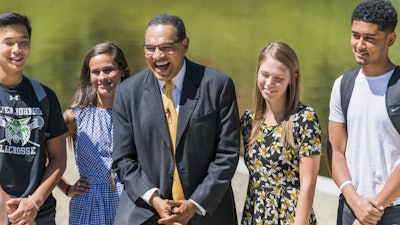 Dr. Freeman A. Hrabowski III
Dr. Freeman A. Hrabowski III
“When I walk around the UMBC campus, it feels like the Plaza of Nations at the [United Nations],” says Hrabowski, whose grandfather was named Freeman because he was not born in bondage, of the diversity on campus. “What’s so different for me is that as a child growing up in Birmingham, I couldn’t have imagined a world like this. The world was all Black — wonderful people, but all Black. I never thought I’d see people from all of humankind studying, laughing, working together.”
“You come on this campus, I promise you, you will feel elevated. You’ll feel the magic. There’s something magical about UMBC. That’s why I’ve stayed for 35 years,” he says.
Still, it was his foundation in that community in Birmingham that made Hrabowski into the man he is. All around him was “a lot of people who cared about other people,” he says, beginning with his “parents, who were always helping others — especially in education.” Whether it was helping men who were working at the steel mill study for their GED, or helping neighbors’ children go to college, the message young Hrabowski heard in church every Sunday around the true measure of a Christian as being in service to others was actively modeled by his parents.
When he arrived on campus at Hampton Institute (now University), he found the same culture of love and service. “We Hamptonians love each other,” says Hrabowski, who met his wife, Jacqueline, on the first day of class at Hampton.
“I challenge every university to have the kind of love that we have at Hampton," he continues. "And I will tell you we have that at UMBC.”
Hrabowski says that message of love has been central to his personal and professional philosophy for over 50 years. “We say that UMBC is the house that love built — it is about how we support our students, and how we give to each other, and how we solve the problems of the larger community” together, he says.
And UMBC alumni are doing just that. Dr. Kizzmekia Corbett, one of the key scientists behind the development of a COVID-19 vaccine, is a UMBC graduate. Adrienne A. Jones, the current speaker of the Maryland House of Delegates and the first woman and African-American person to hold that position, is too. Dr. James P. Clements, president of Clemson University in South Carolina, is also a UMBC graduate. Clements is the first person in his family to graduate from college.
Hrabowski rattles off the names of other UMBC alumni like a proud father sharing updates on all his children and their accomplishments. The place boasts 130 companies on campus started by faculty, students, and others. One in five of those companies have a person of color as CEO, and many are women. The UMBC Retrievers are American Mock Trial Association's 2021 national champions in mock trial. “We beat Yale University,” he says. “And the captain of that team was a Black woman! That was as exciting to me as when we made NCAA history in basketball in 2018” by beating the University of Virginia’s top-seeded Cavaliers as a 16-seed in the NCAA men’s basketball tournament.
“We are proudly a nerdy campus,” says Hrabowski.
In the last two years, two of UMBC’s graduates have gone on to win the Franklin Institute Award, often thought of as the precursor to the Nobel Prize awards in science. It is still a dream of his to see one of his former students receive the Nobel Prize.
Hrabowski himself was elected to the American Academy of Arts and Sciences as well as the American Philosophical Society. In 2018, he was awarded the American Council on Education’s Lifetime Achievement Award. He has also been awarded the McGraw Prize in Education and the U.S. Presidential Award for Excellence in Science, Mathematics, and Engineering Mentoring. In 1988, he co-founded the Meyerhoff Scholars Program to encourage greater participation of underrepresented minorities in science and engineering, and the program is now considered a national model of excellence.
“We have shown that … an institution that started predominately for whites but has always served all students, [and is now] considered minority-serving [and now leads the country in the number of] Blacks who go on to get Ph.D.s in the natural sciences” — a title Hrabowski is proud UMBC has claimed from Howard University — can serve students from all racial and ethnic backgrounds and socioeconomic standings.
Hrabowski, who says “I want to be fully used up when I die,” has no plans of slowing down any time soon. The Howard Hughes Medical Institute last month announced a $1.5 billion award to create The Freeman Hrabowski Scholars Program to support efforts to diversify STEM faculty across the country. There is a building named for him and Jacqueline at their beloved Hampton, and UMBC announced earlier this month at his retirement gala that they will be naming the main administration building on campus after him as well.
“Life is no brief candle,” he says. “I feel very excited about the next chapter.” He’s looking forward to continuing his study of French language and culture, and to consulting with other campus leaders around the country to help spread the UMBC model — one that has seen the university improve from a 35% graduation rate to around 70% for all students, with virtually no racial gaps in graduation numbers.
Hrabowski has been named a Centennial Fellow at the American Council on Education, and will work with the Howard Hughes Medical Institute on his namesake program. He says he is looking forward to enjoying “this next chapter of our lives” with Jackie in particular. “When you’ve got your best friend as your partner in life, in romance, and in all that life holds, you cannot be more fortunate,” he says.















